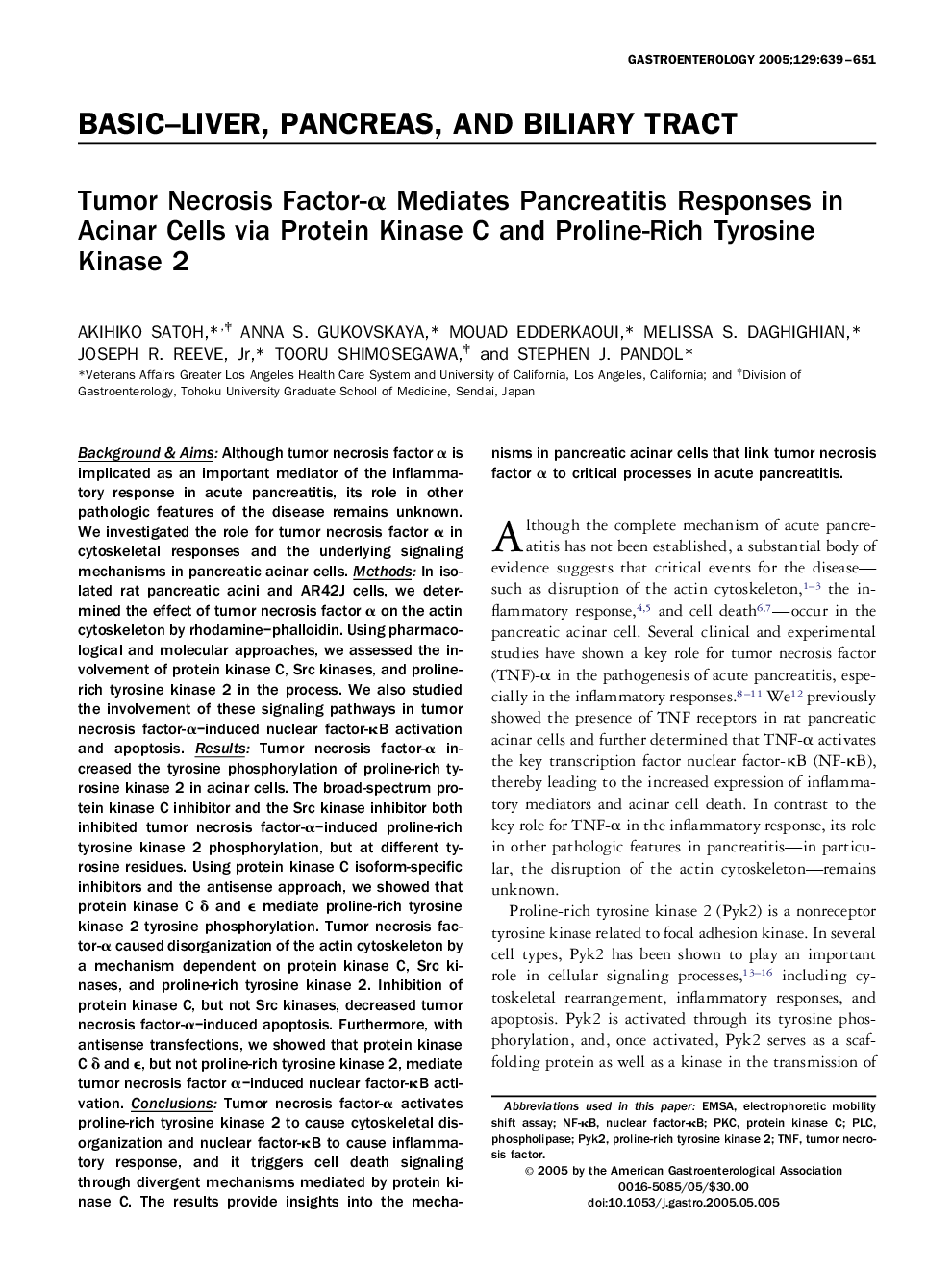| کد مقاله | کد نشریه | سال انتشار | مقاله انگلیسی | نسخه تمام متن |
|---|---|---|---|---|
| 9244149 | 1209903 | 2005 | 13 صفحه PDF | دانلود رایگان |
عنوان انگلیسی مقاله ISI
Tumor Necrosis Factor-α Mediates Pancreatitis Responses in Acinar Cells via Protein Kinase C and Proline-Rich Tyrosine Kinase 2
دانلود مقاله + سفارش ترجمه
دانلود مقاله ISI انگلیسی
رایگان برای ایرانیان
کلمات کلیدی
موضوعات مرتبط
علوم پزشکی و سلامت
پزشکی و دندانپزشکی
بیماریهای گوارشی
پیش نمایش صفحه اول مقاله

چکیده انگلیسی
Background & Aims: Although tumor necrosis factor α is implicated as an important mediator of the inflammatory response in acute pancreatitis, its role in other pathologic features of the disease remains unknown. We investigated the role for tumor necrosis factor α in cytoskeletal responses and the underlying signaling mechanisms in pancreatic acinar cells. Methods: In isolated rat pancreatic acini and AR42J cells, we determined the effect of tumor necrosis factor α on the actin cytoskeleton by rhodamine-phalloidin. Using pharmacological and molecular approaches, we assessed the involvement of protein kinase C, Src kinases, and proline-rich tyrosine kinase 2 in the process. We also studied the involvement of these signaling pathways in tumor necrosis factor-α-induced nuclear factor-κB activation and apoptosis. Results: Tumor necrosis factor-α increased the tyrosine phosphorylation of proline-rich tyrosine kinase 2 in acinar cells. The broad-spectrum protein kinase C inhibitor and the Src kinase inhibitor both inhibited tumor necrosis factor-α-induced proline-rich tyrosine kinase 2 phosphorylation, but at different tyrosine residues. Using protein kinase C isoform-specific inhibitors and the antisense approach, we showed that protein kinase C δ and ϵ mediate proline-rich tyrosine kinase 2 tyrosine phosphorylation. Tumor necrosis factor-α caused disorganization of the actin cytoskeleton by a mechanism dependent on protein kinase C, Src kinases, and proline-rich tyrosine kinase 2. Inhibition of protein kinase C, but not Src kinases, decreased tumor necrosis factor-α-induced apoptosis. Furthermore, with antisense transfections, we showed that protein kinase C δ and ϵ, but not proline-rich tyrosine kinase 2, mediate tumor necrosis factor α-induced nuclear factor-κB activation. Conclusions: Tumor necrosis factor-α activates proline-rich tyrosine kinase 2 to cause cytoskeletal disorganization and nuclear factor-κB to cause inflammatory response, and it triggers cell death signaling through divergent mechanisms mediated by protein kinase C. The results provide insights into the mechanisms in pancreatic acinar cells that link tumor necrosis factor α to critical processes in acute pancreatitis.
ناشر
Database: Elsevier - ScienceDirect (ساینس دایرکت)
Journal: Gastroenterology - Volume 129, Issue 2, August 2005, Pages 639-651
Journal: Gastroenterology - Volume 129, Issue 2, August 2005, Pages 639-651
نویسندگان
Akihiko Satoh, Anna S. Gukovskaya, Mouad Edderkaoui, Melissa S. Daghighian, Joseph R. Jr, Tooru Shimosegawa, Stephen J. Pandol,